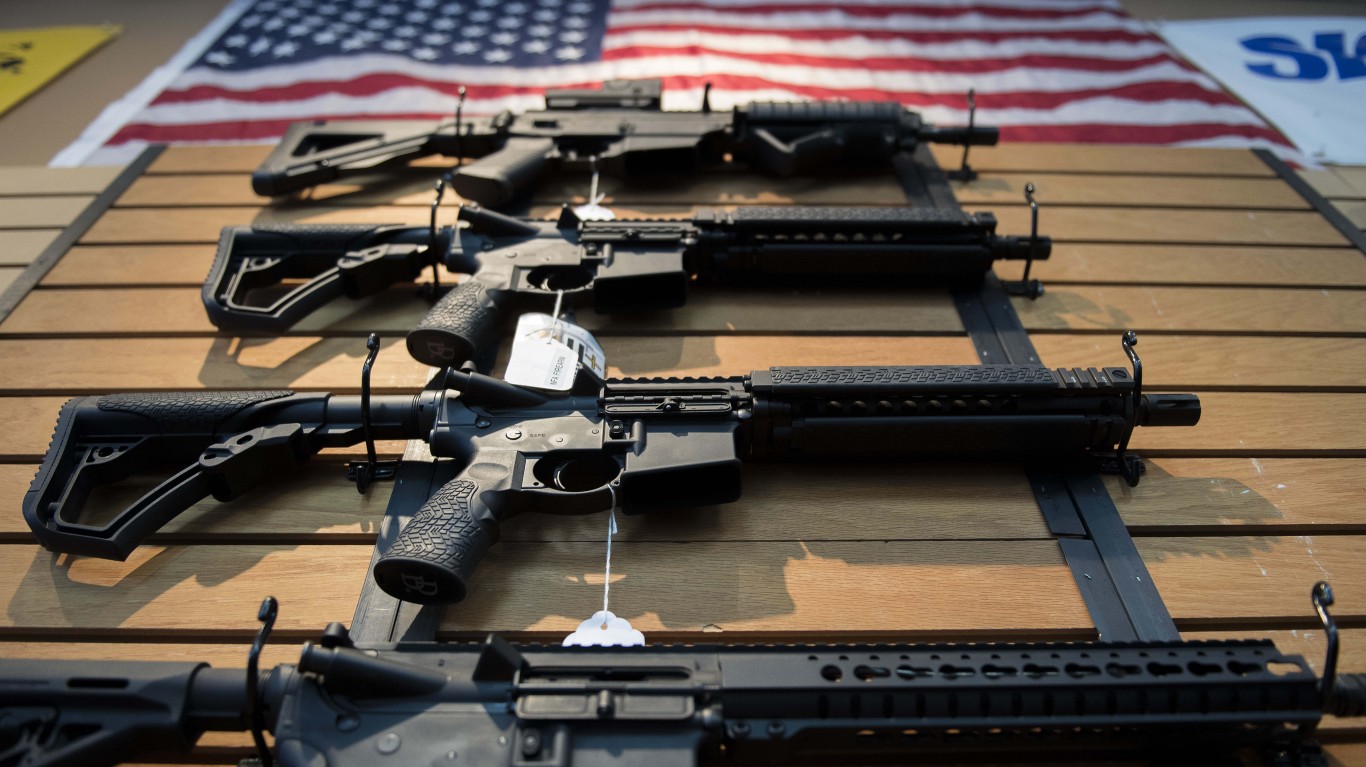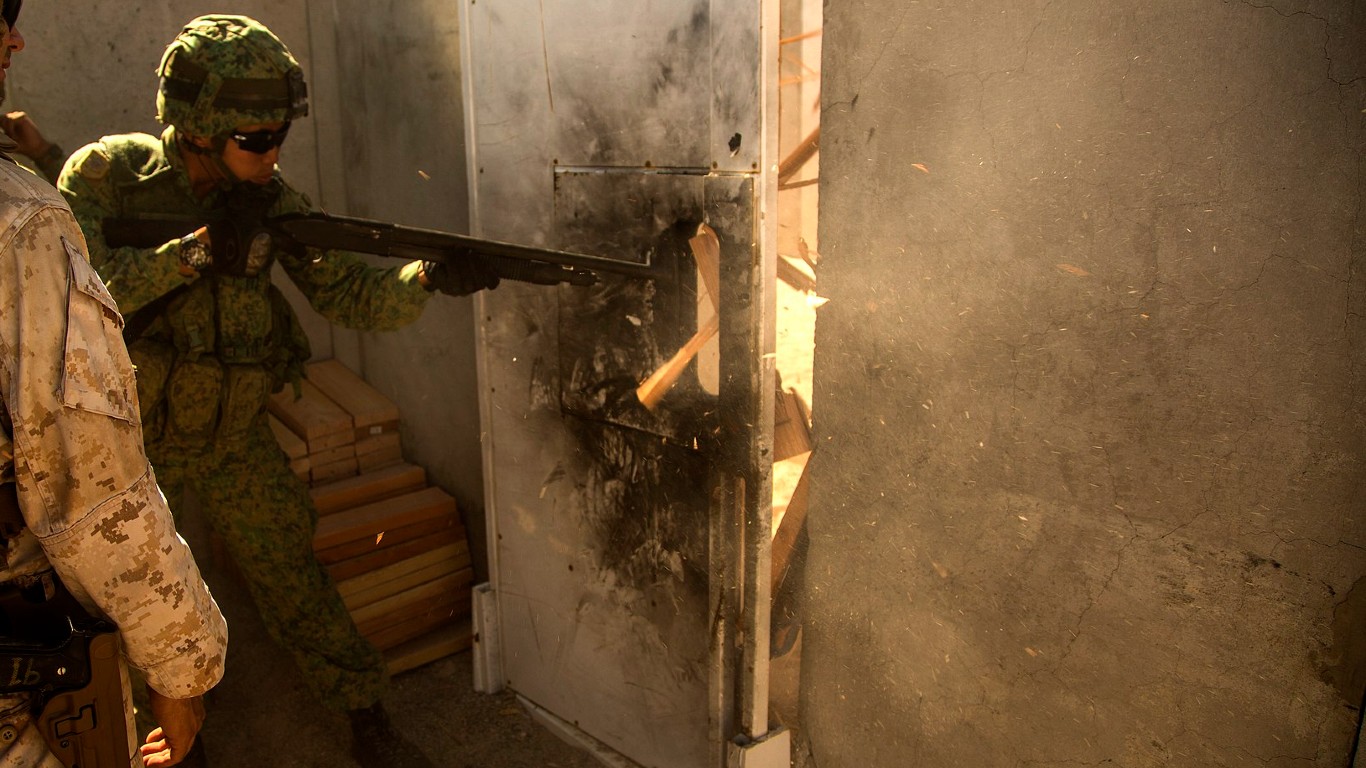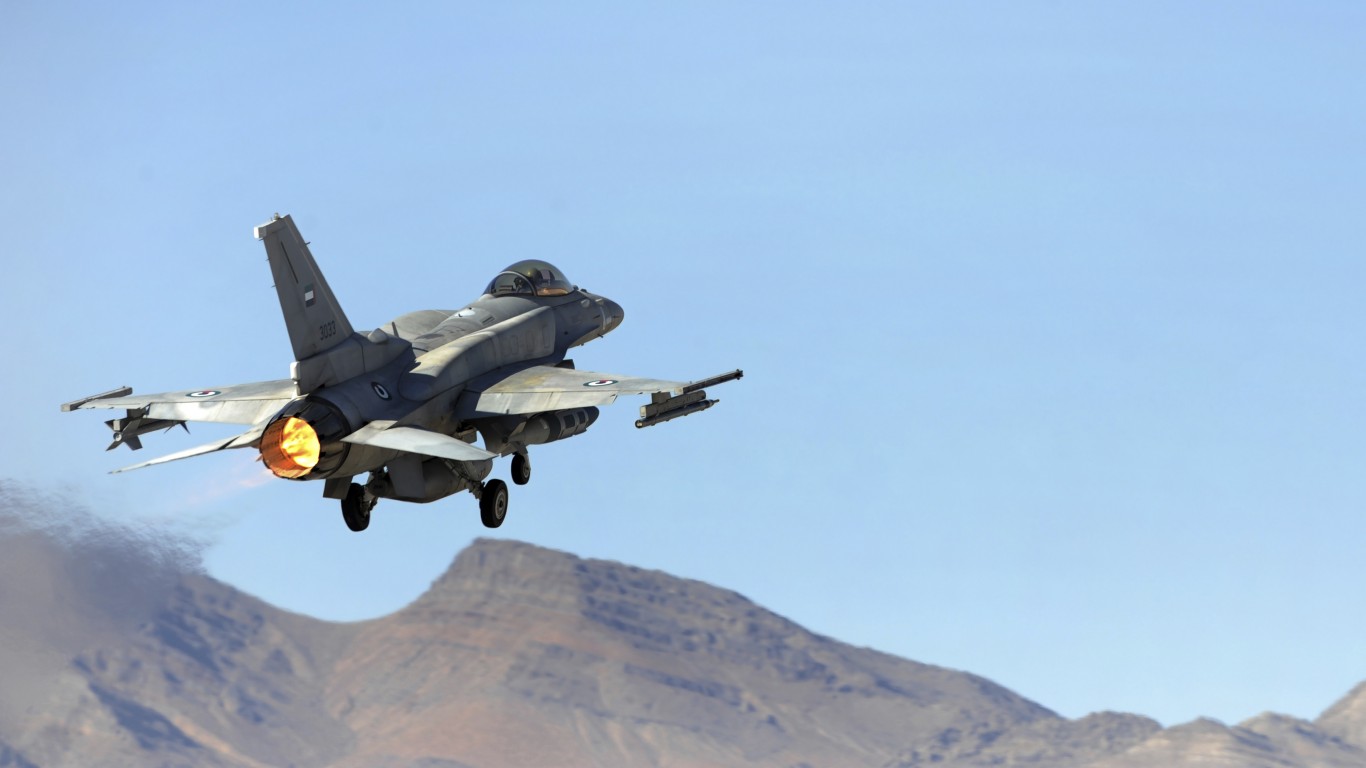Special Report
This Country Buys the Most Weapons From the US Government

Published:

Military power is part of the prevailing discussions about world order – and weapons are part of that power. In the wake of Russia’s attack on Ukraine, many nations, including the United States and many NATO members, have shipped hundreds of millions of dollars worth of weapons to the battered country. Notably, these weapons have been given and not sold. And they have been very effective as the Ukraine military attacks the Russian invaders.
Among the effects of the war in Ukraine is that many countries plan to buy weapons to replace those given to Ukraine. As the “arsenal of democracy,” the United States provides most of these, for a fee, and the country that buys the most weapons from the U.S. government is Saudi Arabia.
The United States is the world’s leading arms exporter, shipping more than $175 billion in arms to nearly 100 different countries around the globe in the 2020 fiscal year alone. In recent years, 22 countries have spent over $1 billion purchasing weapons from the United States.
To determine the country buying the most weapons from the U.S. government, 24/7 Wall St. reviewed data from the Stockholm International Peace Research Institute’s Arms Transfers Database on the value of arms exports from the United States to other countries.
U.S. arms shipments have gone largely to strategic allies in Asia, the Middle East, Europe, and elsewhere. The United States is, of course, not the only arms supplier in the world. Many of the countries on this list also purchase significant amounts of arms from Russia, China, and other nations.
The country the United States sells the most arms to is Saudi Arabia, which imported $17.61 billion worth of arms from the U.S. from 2010 to 2020, or nearly 65% of all its arms imports those years. Other arms suppliers include the United Kingdom and France. The Kingdom spent $57.52 billion in national military expenditure in 2020. (These are the 25 largest arms exporting countries and who they sell to.)
In determining the country buying the most weapons from the U.S. government, countries were ranked based on the total value of arms exports received from the United States from 2010 to 2020. Arms data covers actual deliveries of major conventional weapons. Data on arms imports from the U.S. as a share of a country’s total arms imports was calculated using data from the SIPRI. All other data came from the SIPRI.
Click here to see the countries buying the most weapons from the US government

25. Oman
> Arms imports from US, 2010-2020: $0.78 billion
> US arms imports as share of total, 2010-2020: 24.7%
> Largest arms suppliers, 2016-2020: UK, USA, Turkey
> National military expenditure, 2020: $6.73 billion (10.9% of GDP)
[in-text-ad]

24. Mexico
> Arms imports from US, 2010-2020: $0.81 billion
> US arms imports as share of total, 2010-2020: 43.4%
> Largest arms suppliers, 2016-2020: USA, Netherlands, France
> National military expenditure, 2020: $6.12 billion (0.6% of GDP)

23. Indonesia
> Arms imports from US, 2010-2020: $0.89 billion
> US arms imports as share of total, 2010-2020: 16.3%
> Largest arms suppliers, 2016-2020: USA, Netherlands, South Korea
> National military expenditure, 2020: $9.40 billion (0.9% of GDP)

22. Kuwait
> Arms imports from US, 2010-2020: $1.37 billion
> US arms imports as share of total, 2010-2020: 75.4%
> Largest arms suppliers, 2016-2020: N/A
> National military expenditure, 2020: $6.94 billion (6.5% of GDP)
[in-text-ad-2]

21. Netherlands
> Arms imports from US, 2010-2020: $1.55 billion
> US arms imports as share of total, 2010-2020: 63.7%
> Largest arms suppliers, 2016-2020: USA, Germany, Italy
> National military expenditure, 2020: $12.58 billion (1.4% of GDP)

20. Norway
> Arms imports from US, 2010-2020: $1.83 billion
> US arms imports as share of total, 2010-2020: 61.4%
> Largest arms suppliers, 2016-2020: USA, South Korea, Italy
> National military expenditure, 2020: $7.11 billion (1.9% of GDP)
[in-text-ad]

19. Canada
> Arms imports from US, 2010-2020: $1.90 billion
> US arms imports as share of total, 2010-2020: 68.2%
> Largest arms suppliers, 2016-2020: USA, Australia, Israel
> National military expenditure, 2020: $22.75 billion (1.4% of GDP)

18. Italy
> Arms imports from US, 2010-2020: $2.06 billion
> US arms imports as share of total, 2010-2020: 64.4%
> Largest arms suppliers, 2016-2020: USA, Germany, Italy
> National military expenditure, 2020: $28.92 billion (1.6% of GDP)

17. Morocco
> Arms imports from US, 2010-2020: $2.09 billion
> US arms imports as share of total, 2010-2020: 46.6%
> Largest arms suppliers, 2016-2020: USA, France, UK
> National military expenditure, 2020: $4.83 billion (4.3% of GDP)
[in-text-ad-2]

16. Pakistan
> Arms imports from US, 2010-2020: $2.10 billion
> US arms imports as share of total, 2010-2020: 19.5%
> Largest arms suppliers, 2016-2020: China, Russia, Italy
> National military expenditure, 2020: $10.38 billion (4.0% of GDP)

15. Egypt
> Arms imports from US, 2010-2020: $2.56 billion
> US arms imports as share of total, 2010-2020: 20.9%
> Largest arms suppliers, 2016-2020: Russia, France, USA
> National military expenditure, 2020: $4.51 billion (1.2% of GDP)
[in-text-ad]

14. Afghanistan
> Arms imports from US, 2010-2020: $2.72 billion
> US arms imports as share of total, 2010-2020: 76.0%
> Largest arms suppliers, 2016-2020: USA, Brazil, Belarus
> National military expenditure, 2020: $0.28 billion (1.4% of GDP)

13. Israel
> Arms imports from US, 2010-2020: $3.09 billion
> US arms imports as share of total, 2010-2020: 70.1%
> Largest arms suppliers, 2016-2020: USA, Germany, Italy
> National military expenditure, 2020: $21.70 billion (5.6% of GDP)

12. Singapore
> Arms imports from US, 2010-2020: $3.15 billion
> US arms imports as share of total, 2010-2020: 53.2%
> Largest arms suppliers, 2016-2020: USA, Spain, France
> National military expenditure, 2020: $10.86 billion (3.2% of GDP)
[in-text-ad-2]

11. Qatar
> Arms imports from US, 2010-2020: $3.33 billion
> US arms imports as share of total, 2010-2020: 51.0%
> Largest arms suppliers, 2016-2020: USA, France, Germany
> National military expenditure, 2020: N/A (0.0% of GDP)

10. Turkey
> Arms imports from US, 2010-2020: $3.70 billion
> US arms imports as share of total, 2010-2020: 48.6%
> Largest arms suppliers, 2016-2020: USA, Italy, Spain
> National military expenditure, 2020: $17.72 billion (2.8% of GDP)
[in-text-ad]

9. Taiwan
> Arms imports from US, 2010-2020: $3.70 billion
> US arms imports as share of total, 2010-2020: 96.7%
> Largest arms suppliers, 2016-2020: USA
> National military expenditure, 2020: $12.15 billion (1.9% of GDP)

8. Iraq
> Arms imports from US, 2010-2020: $3.87 billion
> US arms imports as share of total, 2010-2020: 51.7%
> Largest arms suppliers, 2016-2020: USA, Russia, South Korea
> National military expenditure, 2020: $7.02 billion (4.1% of GDP)

7. United Kingdom
> Arms imports from US, 2010-2020: $3.88 billion
> US arms imports as share of total, 2010-2020: 71.4%
> Largest arms suppliers, 2016-2020: USA, Spain, Germany
> National military expenditure, 2020: $59.24 billion (2.2% of GDP)
[in-text-ad-2]

6. India
> Arms imports from US, 2010-2020: $4.22 billion
> US arms imports as share of total, 2010-2020: 11.7%
> Largest arms suppliers, 2016-2020: Russia, France, Israel
> National military expenditure, 2020: $72.89 billion (2.9% of GDP)

5. Japan
> Arms imports from US, 2010-2020: $4.52 billion
> US arms imports as share of total, 2010-2020: 94.0%
> Largest arms suppliers, 2016-2020: USA, UK, Sweden
> National military expenditure, 2020: $49.15 billion (1.0% of GDP)
[in-text-ad]

4. UAE
> Arms imports from US, 2010-2020: $7.11 billion
> US arms imports as share of total, 2010-2020: 61.4%
> Largest arms suppliers, 2016-2020: USA, France, Russia
> National military expenditure, 2020: N/A (0.0% of GDP)

3. South Korea
> Arms imports from US, 2010-2020: $7.82 billion
> US arms imports as share of total, 2010-2020: 70.3%
> Largest arms suppliers, 2016-2020: USA, Germany, Spain
> National military expenditure, 2020: $45.74 billion (2.8% of GDP)

2. Australia
> Arms imports from US, 2010-2020: $9.13 billion
> US arms imports as share of total, 2010-2020: 67.0%
> Largest arms suppliers, 2016-2020: USA, Spain, Switzerland
> National military expenditure, 2020: $27.54 billion (2.1% of GDP)
[in-text-ad-2]

1. Saudi Arabia
> Arms imports from US, 2010-2020: $17.61 billion
> US arms imports as share of total, 2010-2020: 64.8%
> Largest arms suppliers, 2016-2020: USA, UK, France
> National military expenditure, 2020: $57.52 billion (8.4% of GDP)
Methodology
To determine the countries buying the most weapons from the U.S. government, 24/7 Wall St. reviewed data on the value of arms exports from the United States to other countries from the Stockholm International Peace Research Institute’s Arms Transfers Database. Countries were ranked based on the total value of arms exports received from the United States from 2010 to 2020. Arms data covers actual deliveries of major conventional weapons. Supplemental data on arms imports from the U.S. as a share of a country’s total arms imports was calculated using data from SIPRI. Data on the largest arms suppliers by total value from 2016 to 2020, as well as national military expenditure in 2020 and national military expenditure as a percentage of gross domestic product in 2020 came from SIPRI.
Retirement planning doesn’t have to feel overwhelming. The key is finding expert guidance—and SmartAsset’s simple quiz makes it easier than ever for you to connect with a vetted financial advisor.
Here’s how it works:
Why wait? Start building the retirement you’ve always dreamed of. Click here to get started today!
Thank you for reading! Have some feedback for us?
Contact the 24/7 Wall St. editorial team.